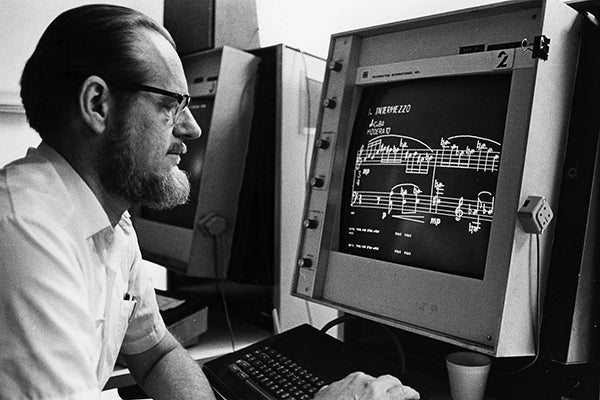Stanford Professor Emeritus Leland Smith died Dec. 17 at his home in Palo Alto, Calif. He was 88 years old. He was an educator, composer, bassoonist and computer coder who led music publishing into the digital age.

Leland Smith led music publishing into the digital age. In this 1976 photo, he works with music displayed on a CRT monitor. (Image credit: Chuck Painter / Stanford News Service)
A memorial gathering will be held at the Center for Computer Research in Music and Acoustics (CCRMA) at 2 p.m. Saturday, Jan. 18. The center is at 660 Lomita Drive on the Stanford campus.
A co-founder of the center, Smith taught composition and theory in Stanford’s Department of Music starting in 1958. As a skilled programmer, he made lasting contributions to music’s digital age with his music input system, music typesetting research and computer music. SCORE, his music notation input program, was the first program of its kind and is considered today’s quality standard.
Smith’s computer music and coding made headlines during his tenure. One from the San Jose Mercury on April 14, 1976, reads: “Computer turns composer – writes music.” Another in the Oakland Tribune on May 11, 1978, proclaims: “Prof teaches computer to take tedium out of music business.”
“Many of us had the freedom to navigate our passions and careers because of Leland’s encouragement and his dedication to music at Stanford,” said Chris Chafe, professor of music and current director of CCRMA.
Professor Emeritus John Chowning, a former graduate student and colleague of Smith’s, recalls his mentor’s innate commitment to perfection and “a mind that seemed preternaturally in synch with computer coding.”
In 1964, when Chowning told Smith, his adviser in music composition at the time, that he wanted to pursue computer synthesis of musical sound in the final two years of his graduate work, Smith replied, “Absolutely, do it, but promise that you will show me all that you learn when I return [from sabbatical].”
Chowning recalls that he did just that.
“Leland learned to program quickly,” he said, “complementing my work in sound synthesis with a music notation input language, SCORE. His vision and his deep knowledge of music notation extended SCORE to computerized music typography, which became, and remains, the benchmark by which all published music is judged.”
Musical life
Leland Smith was born in Oakland, Calif., in 1925. At the age of 15 he became a student of the modernist composer Darius Milhaud. He earned bachelor’s and master’s degrees from the University of California-Berkeley, where he studied with Roger Sessions, and later attended the Paris Conservatory.
Smith served in the U.S. Navy, 1943-46, and began teaching in 1951, first taking over Milhaud’s courses at Mills College, then at the University of Chicago and finally at Stanford, where he retired in 1992. He performed with New York City Ballet, Chicago Lyric Opera, Chicago Symphony, San Francisco Opera and San Francisco Symphony.
Smith was married for 65 years to Edith Smith, an artist and teacher, who died in 2011. He is survived by his children, Stefanie, Clement and Teresa.
Memorial gifts can be made to the Palo Alto Donkey Project, or to the Leland and Edith Smith Fund for Music, by check to “Stanford University, The Leland and Edith Smith Fund for Music” mailed to Stanford University, Development Services, PO Box 20466, Stanford, CA 94309-0466, or by calling 866-543-0243 (international 1-650-724-0627